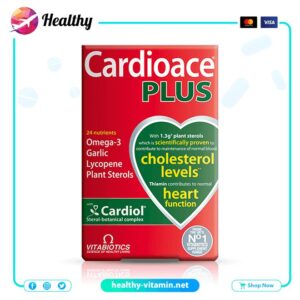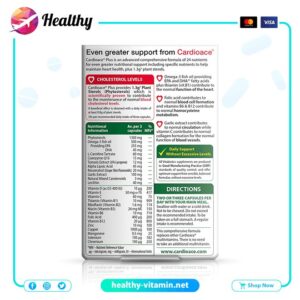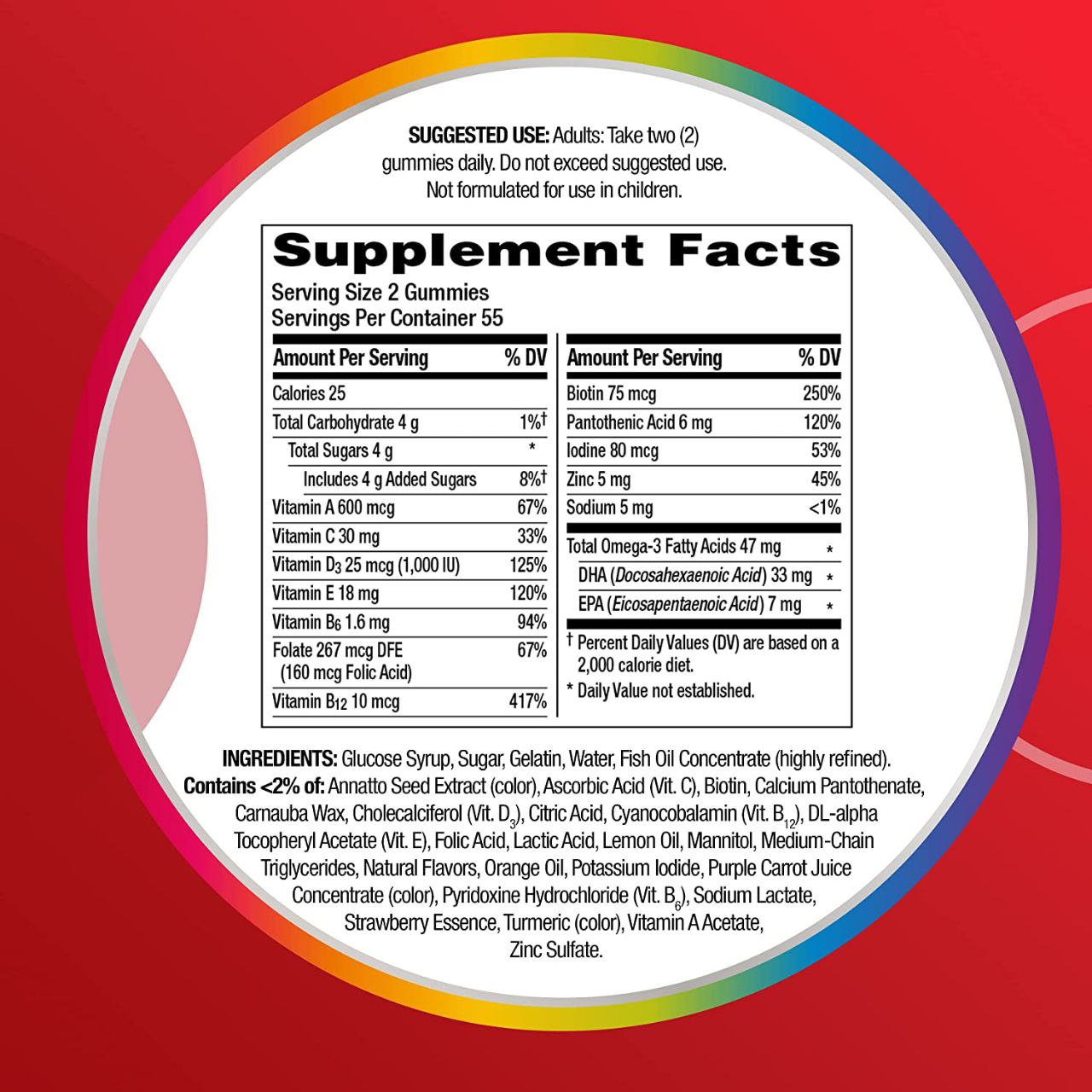Description
Omega-3 Fish Oil Puritan’s Pride
Product details
Just the Facts on Fish Oil
It’s estimated that more than 1 in 3 U.S. adults have at least one type of cardiovascular disease, such as coronary heart disease.3
EPA and DHA
Getting enough EPA and DHA omega-3s from fish oil helps maintain the health of your cardiovascular system and supports healthy circulation.**
Are you getting enough?
More than 90% of U.S. adults don’t get enough of EPA and DHA omega-3s from fish to meet current recommendations for cardiovascular health.1,2
Dietary recommendations
To consume at least two servings of a variety of seafood, preferably fatty fish rich in DHA and EPA omega-3 fatty acids, per week.1,2
Risk factors
There are many risk factors for cardiovascular disease that include smoking, a sedentary or inactive lifestyle, and poor nutrition.3
Are You Getting Enough Omega-3s for Your Heart?
Since the initial discovery of the connection between fish oil and heart health in the 1970s, there have been more than 36,000 studies on eicosapentaenoic acid (EPA) and docosahexaenoic acid (DHA) omega-3 fatty acids. These two main omega-3s, found in fish oil, are now among the most thoroughly studied nutrients in the world for heart health.
Because of the vast body of scientific evidence, the American Heart Association and the U.S. Department of Health and Human Services have aligned in making recommendations for fatty fish intake, along with achieving a balanced diet and an active lifestyle, for reducing the risk of cardiovascular disease.
Additionally, the FDA has a qualified health claim related to EPA and DHA omega-3s: “Supportive but not conclusive research shows that the consumption of EPA and DHA omega-3 fatty acids may reduce the risk of coronary heart disease.” For information regarding dosage of omega-3 fatty acids, see the supplements facts panel on your product label.
Not All Fish Oil Is the Same
When choosing the right fish oil product for you, make sure to understand your potency and speak to your health care provider to see what dosage is right for you. Pay attention to the total amount of EPA and DHA omega-3s contained in your fish oil supplement. The higher concentration of DHA and EPA, the less softgels you’ll need to take to get enough omega-3s!
Omega-3 Fish Oil Puritan’s Pride
Puritan’s Pride®
Omega-3 Fish Oil 1000 mg (300 mg Active Omega-3)
Puritan’s Pride® Coated Omega-3 Fish Oil supports heart, skin, and joint health.** These fish oil softgels are coated to minimize “fishy” aftertaste and are purified to eliminate mercury. Each softgel contains 300 mg of total omega-3s including EPA and DHA.
Guaranteed Quality.
One Serving Per Day
Important for
Heart Health**
Supports Joint
and Skin Health**
300 mg
Total Omega-3s
Guaranteed Purity
Puritan’s Pride Fish Oil has guaranteed efficacy and safety. The raw and fresh fish oil undergoes advanced purification steps to concentrate the omega-3s oils while helping to remove unwanted compounds or contaminants.
Following their manufacturing, the finished fish oil softgels are also tested to ensure product quality, efficacy, and safety. These are evaluated based on methodology as outlined and developed by the Global Organization for EPA and DHA Omega-3 (GOED), an organization that has set the standard for fish-derived omega-3 oils in the industry.
Omega-3 Fish Oil Puritan’s Pride
Sustainably Harvested
Puritan’s Pride is actively engaged in qualifying fish oil suppliers that are committed to sustainable sourcing practices. We understand that leveraging our influence can help drive and strengthen the sustainable sourcing of fish oil across the natural products industry.
Sustainability of fish oil begins with high expectations of our partners. By choosing the right fish oil suppliers, we help to encourage sustainability efforts, support the preservation of biodiversity including avoidance of “bycatch” of endangered species, and ultimately delivering a quality product.

Guaranteed Freshness
Omega-3 Fish Oil Puritan’s Pride
Naturally sourced mixed tocopherols (including alpha-tocopherol, or vitamin E) are added to our fish oil softgels during the time of manufacturing. These help to maintain the freshness of the fish oil and the integrity of the polyunsaturated oils, including EPA and DHA omega-3 fatty acids.
What’s the science behind omega-3s?
In the early 1970s, Danish researchers were the first to raise awareness of the possible benefits of fish oil after publishing their report on the low incidence of cardiovascular disease in Greenland’s Inuit population despite their high fat diets.4,5 Only on a hunch, the scientists had proposed that a potential explanation was the “large amounts of polyunsaturated fats” found in the fatty tissues of the fish and seal meat that was a regular part of Inuit meals.4,5
Nearly a half century later, there have been more than 36,000 papers published, including more than 4000 human clinical trials, on the benefits of EPA and DHA omega-3 fatty acids. Based on the large body of evidence, the scientific consensus is that these long-chain omega-3s have a positive impact on various body systems including the heart, the brain, skin and joints, and the eyes**. These benefits can depend on the quantities of EPA and DHA omega-3s consumed daily.
What about sustainability and quality?
During the last decade, the sustainable harvest and manufacturing of fish oil has been subject to several advancements. Puritan’s Pride has partnered with suppliers with a strong commitment to high quality, freshness, and sustainability.
Our company is also a member of the Global Organization for EPA and DHA Omega-3 (GOED), an organization that is a leader in advocating the consumption of fish oil-derived omega-3s and has set the standard for quality in the omega-3 industry. GOED members are expected to follow strict ethical guidelines in the manufacturing and the marketing of fish oil products related to benefits and quality.
Puritan’s Pride has partnered with suppliers with a strong commitment to high quality, freshness, and sustainability.

What’s so essential about omega-3s?
Because our bodies can’t make them on their own, both omega-3s (as alpha-linolenic acid) and omega-6s (as linoleic acid) are considered essential. A balanced dietary intake of both omega-3s and omega-6s are needed for human health.
Omega-3 fatty acids, in particular, are necessary as structural components for cell membranes and cell-signaling molecules for proper function. We require them for the maintenance of all of our body’s cells and several body systems and organs, such as our hearts, joints, brains, and eyes.**
is an essential omega-3 found mainly in plant sources such as walnuts, chia, and flax seed. Most of us get enough of this kind and it’s considered the “parent” omega-3 in relation to EPA and DHA.
are found mainly in fatty fish such as anchovies, sardines, salmon, and mackerel. These long-chain omega-3s are considered the “offspring” of ALA and they are associated with a wide range of health benefits.**
How much EPA and DHA do I need?
While most of us get plenty of ALA from our diets, our bodies don’t convert these shorter-chain omega-3s to their longer-chain counterparts well enough.
Because of these poor conversion rates, it’s important to focus on obtaining more EPA and DHA from fish and fish oil supplements for cardiovascular and overall health.**
The 2015-2020 Dietary Guidelines for Americans recommend consuming about 8 ounces per week of a variety of seafood, providing an average of 250 milligrams per day of EPA and DHA, for general heart health.**6
Omega-3 Fish Oil Puritan’s Pride
The International Scientific Society for the Study
of Fatty Acids and Lipids (ISSFAL) and GOED recommend getting:
250-500 milligrams per day
of EPA and DHA
for generally healthy adults.
700 milligrams
of EPA and DHA
for pregnant and lactating women.
At least 300 mg should be DHA.
1000 milligrams or more
of EPA and DHA
for those seeking a range of
additional health benefits.**
What are other benefits of EPA and DHA intake?
While EPA and DHA omega-3s from fish oil are primarily known for their role in heart health,*
the benefits of these “good fats” extend far beyond that of your cardiovascular system.**
All your cells: Omega-3s are some of the most important fatty acids you need for cellular health.** They play a key structural role in the membranes of every cell in your body and are essential for normal cell growth.**
Metabolism: Because of their roles in cell-signaling, EPA and DHA are important fatty acids you need to support metabolic health.**
Skin and joints: EPA and DHA are essential for keeping skin looking healthy and supporting joint health.**
Triglyceride levels and Circulation: Beyond other well-documented cardiovascular benefits, a dosage of at least 900 mg per day of EPA and DHA helps maintain triglyceride levels already within a normal range.** EPA and DHA also support healthy circulation.**
Mom and Baby: During times of pregnancy and breastfeeding, DHA helps replenish supplies for mom and supports baby’s brain and eye development.** A dose of at least 200 mg per day of DHA can help support moms before, during, and after pregnancy.**
Brain: Omega-3s, primarily as DHA, are naturally found in our brain, as part of brain cell membranes. These omega-3s play an important role in normal brain structure.** A dosage of 2620 milligrams per day of EPA and DHA can help support brain health.**
Eyes: For those spending a lot of time in front of a computer, a dosage of 1200 milligrams per day of EPA and DHA may help with occasional dry eyes.**
There’s no need to supplement with fish oil if you consume seafood regularly?
Seafood is not only a great source of protein, but also rich in long-chain omega-3 EPA and DHA fatty acids. Unfortunately, the quality matters. Some types of seafood may contain high levels of heavy metals such as mercury that could be harmful to health. The way seafood is prepared can also have an impact on the delicate nature of the polyunsaturated EPA and DHA oils.
The best dietary sources of EPA and DHA omega-3s include salmon, anchovies, herring, shad, sardines, Pacific oysters, trout, and Atlantic and Pacific mackerel. Especially if pregnant or breastfeeding, it’s important to limit or avoid intake of swordfish, King mackerel, tilefish, Bigeye tuna, marlin and orange roughly because of high levels of mercury.
Cooking, especially frying, can harm the inherent properties of polyunsaturated oils. For this reason, fried fish is not recommended as a dietary source of EPA and DHA omega-3s. Additionally, the kinds of fish that are typically used in frying, such as haddock, tilapia, or cod, and other white fish tend to have low amounts of polyunsaturated oils.
Regardless of intake, scientific data from national surveys and blood analysis has shown that a majority of U.S. adults don’t meet dietary recommendations for omega-3 intake and have lower than recommended plasma levels of EPA and DHA omega-3s.1,2 For these reasons, dietary supplementation is a useful strategy for receiving EPA and DHA omega-3s from fish in optimum amounts daily to fulfill nutritional gaps or to receive desired benefits.**
Can you can get all the omega-3s you need from plants?
While it’s true that plant foods such as walnuts and flaxseed are rich in alpha-linolenic acid, an essential omega 3 fatty acid, conversion to long-chain EPA and DHA are low in humans. Quite specifically, EPA and DHA are the two omega-3s that have been heavily studied and reported to contribute to overall health benefits including cardiovascular health.*
Are some forms of EPA and DHA omega-3s better than other forms for the body?
Whether from fish, krill, algae, as ethyl esters or triglycerides, it’s the total amount of EPA and DHA in the end that matters most for increasing plasma levels in the body.
Does liquid fish oil lead to greater absorption of DHA and EPA as compared to softgels?
There is no difference in absorption of DHA and EPA omega-3s whether they are present as a liquid in a bottle or in softgels. However, softgels help to minimize any degradation of fish oil while liquid oils may be subject to degradation if exposed to light, heat, or oxygen.
Is it best to take a supplement that includes a blend of polyunsaturated oils including omega-3, omega-6, and omega-9 fatty acids?
A balanced intake of polyunsaturated oils including omega-3s as alpha-linolenic acid and omega-6s as linoleic acid is essential for health. While omega-9 oils still may be considered a nutritious component of the diet, they are not considered essential.
For the most part, these are all found in plentiful amounts in our diets so supplementation isn’t generally necessary. The exception is DHA and EPA omega-3s, which are polyunsaturated oils found mainly in fatty fish and fish oil supplements that are associated with a wide variety of health benefits.**
Is the use of mixed tocopherols in fish oil unhealthy?
In dietary supplements such as softgels, mixed tocopherols, including d-alpha tocopherol (vitamin E), help maintain the freshness of fish oil products.
Supportive but not conclusive research shows that the consumption of EPA and DHA omega-3 fatty acids may reduce the risk of coronary heart disease.
References:
- 1. Murphy RA, Yu EA, Ciappio ED, Mehta S, McBurney MI. Suboptimal plasma long chain n-3 concentrations are common among adults in the United States, NHANES 2003–2004. Nutrients. 2015;7(12):10282-10289. doi:10.3390/nu7125534
- 2. Papanikolaou Y, Brooks J, Reider C, Fulgoni VL. U.S. adults are not meeting recommended levels for fish and omega-3 fatty acid intake: Results of an analysis using observational data from NHANES 2003-2008. Nutr J. 2014. doi:10.1186/1475-2891-13-31
- 3. Subcommittee S. AHA Statistical Update. Circulation. 2008;117:e25-e146.
- 4. Bang HO, Dyerberg J, Nielsen AB. PLASMA LIPID AND LIPOPROTEIN PATTERN IN GREENLANDIC WEST‐COAST ESKIMOS. Nutr Rev. 1986. doi:10.1111/j.1753-4887.1986.tb07607.x
- 5. Bang HO, Dyerberg J, Sinclair HM. The composition of the Eskimo food in north Western Greenland. Am J Clin Nutr. 1980.
- 6. USDA. 2015 – 2020 Dietary Guidelines for Americans. 2015 – 2020 Diet Guidel Am (8th Ed. 2015:18. doi:10.1097/NT.0b013e31826c50af
Omega-3 Fish Oil Puritan’s Pride
Supplement Facts |
|
| Serving Size 1 Softgel | |
| Servings Per Container 60 | |
| Amount Per Serving | % Daily Value |
| Calories 10 | |
| Calories from Fat 10 | |
| Total Fat | 1 g 2%* |
| Cholesterol | 5 mg 2% |
| Ester-Omega® Fish Oil 1,000 mg (1 g) **** | |
| provides 300mg of Total Omega-3 Fatty Acids† comprising of | |
| EPA (Eicosapentaenoic Acid) **** | |
| DHA (Docosahexaenoic Acid) **** | |
| Other Fatty Acids ** | |
| *Percent Daily Values are based on a 2,000 calorie diet. | |
| **Daily Value not established. | |
Directions: For adults, take one (1) softgel three times daily, preferably with meals.
Other Ingredients: Gelatin, Vegetable Glycerin, Food Glaze. Contains <2% of: Acetylated Monoglycerides, Mixed Natural Tocopherols, Polysorbate 80, Sodium Alginate, Sorbic Acid (preservative). Contains fish (anchovy, mackerel, sardine) ingredients.
WARNING: If you are pregnant, nursing, taking any medications, including blood thinners, planning any medical or surgical procedure or have any medical condition, consult your doctor before use. Discontinue use and consult your doctor if any adverse reactions occur. Keep out of reach of children. Store at room temperature. Do not use if seal under cap is broken or missing.
No Artificial Color, Flavor or Sweetener, No Sugar, No Starch, No Milk, No Lactose, No Gluten, No Wheat, No Yeast, No Shellfish.
Why Choose Puritan’s Pride?
Getting the most out of life every day is what inspires us to deliver over 3,000 outstanding products that help you achieve your health and wellness goals.
We take pride in manufacturing the vitamins, minerals and herbal supplements that complement your healthy lifestyle, plus we offer essential oils, nutritious foods and more.
So get out there and embrace life… because the journey is your reward.
Trusted and Loved
by Generations of Families
for Over 45 Years
- Highest Quality Vitamins
- Scientifically Formulated
- Exceptional Value
- U.S. Manufactured, Sourced
from Around the World - Delivered to Your Door
Omega-3 Fish Oil Puritan’s Pride

























Reviews
There are no reviews yet.